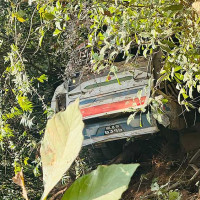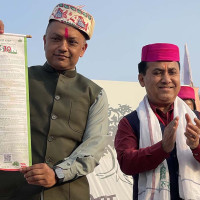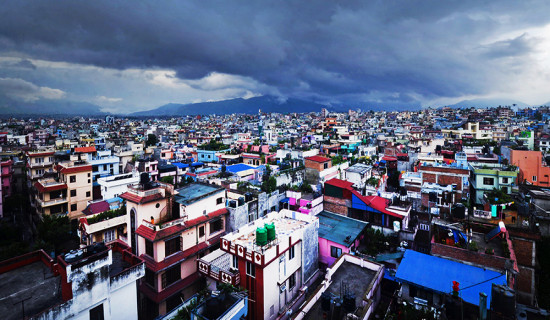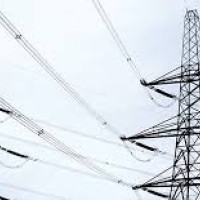- Thursday, 19 February 2026
Address School Teachers' Genuine Demands
All educational activities in community schools have come to a halt nationwide as schoolteachers have kept staging their Kathmandu-centric protests for more than two weeks, putting up various demands. They have wanted the government to enact the School Education Bill as early as possible. The Nepal Teachers’ Federation (NTF), an umbrella federation of schoolteachers, announced a general strike in school education on April 1 when the winter session of the federal parliament was prorogued, leaving several important bills, including the School Education Bill, unendorsed.
This bill has been under consideration in the federal parliament for over one and a half years. With schoolteachers piling pressure on the government to get the much-awaited bill passed through the parliament, a subcommittee formed by the Education, Health and Information Technology Committee under the House of Representatives has now been discussing the bill, seeking a swift consensus on it. The government has also decided to summon the budget session of the federal parliament on April 25 to get the bill approved as soon as possible.
Demands
The major demands raised by schoolteachers include formal recognition of teaching profession as part of the education service, standardised salary scales, inclusion in social security and retirement schemes, clear definition of their roles, workloads, periodic promotions on a par with the civil servants, legal protection against arbitrary dismissal by school management committees, among others. Besides, they have also sought a rise in salary of Early Childhood Development (ECD) facilitators, determination of the order of precedence for teachers and dearness allowance for school employees.
They have demanded that the government fulfill their demands and implement all the past agreements. But, they have also shown their reluctance to work under the local government. The present constitution has a clear provision for community school teachers to serve under the local level. However, schoolteachers have now become flexible on this demand as it is against the spirit of federalism. Schoolteachers are not in favour of calling off their strike just by signing agreements with the government this time, as they have felt deceived in the past.
The two sides had inked agreements on addressing the demands three times. But the teachers blame the successive governments for not being serious about meeting their demands. As most of the demands are genuine and protests have remained quite peaceful, the schoolteachers have been able to garner sympathy and support from different sections of society, including political parties. Even some influential leaders belonging to the ruling Nepali Congress have asked the government to pay urgent attention to the schoolteachers’ demands, considering the rising cost of the lingering protests for the country’s education sector.
With the persistent school shutdown disrupting the national enrollment campaign and evaluation of answer sheets of the recently concluded Secondary Education Examination (SEE), the government has tried to return the stirring teachers to classrooms. Representatives of the government and the NTF have recently held some rounds of formal and informal talks to end the deadlock. Prime Minister KP Sharma Oli and the NTF representatives have also discussed the matter. The Prime Minister has asked the agitating teachers to suspend their protests and resume school activities as the government is ready to meet their legitimate concerns as soon as possible. But, the NTF has sought an immediate fulfillment of their demands.
The final exams of Grade 12 are scheduled to commence on April 24. Though the National Examination Board (NEB) is determined to conduct the exams as scheduled, they are likely to be affected if the ongoing strike does not come to an end immediately. The NTF has already appealed to all headmasters and teachers not to carry out any official responsibilities unless and until their demands are addressed. Those duties include an evaluation of exam sheets, publication of exam results, students’ enrollment, and participation in academic programmes such as training and seminars and educational tours. It has also called on exam centre supervisors and invigilators to reject exam duties. The academic calendar might be disturbed if exams are not conducted on time.
Motivation
The country has spent a lot of money on the education sector over many years. But returns on investments have not been as satisfactory as they should have been. Results of SEE and Grade 12 in recent years have shown that a large number of students performed below expectations. Many students were unable to gain the minimum GPA required for higher education. This paints a bleak picture of the country’s school education. As quality education is the key foundation for the overall development of any country, imparting such education to children is essential. Proper regulation and motivation for teachers are necessary for improving the quality of our education.
A direct involvement of teachers in party politics has been a major problem hindering the enhancement of education quality. So, the School Education Bill must have a mandatory provision for teachers to stay away from party politics. The teaching profession must be made dignified and attractive to bring more competent and energetic young minds into it, who alone can contribute towards upgrading the quality of education to meet the country’s present-day needs.
(The author is a former deputy executive editor of this daily.)



-original-thumb.jpg)










-original-thumb.jpg)
